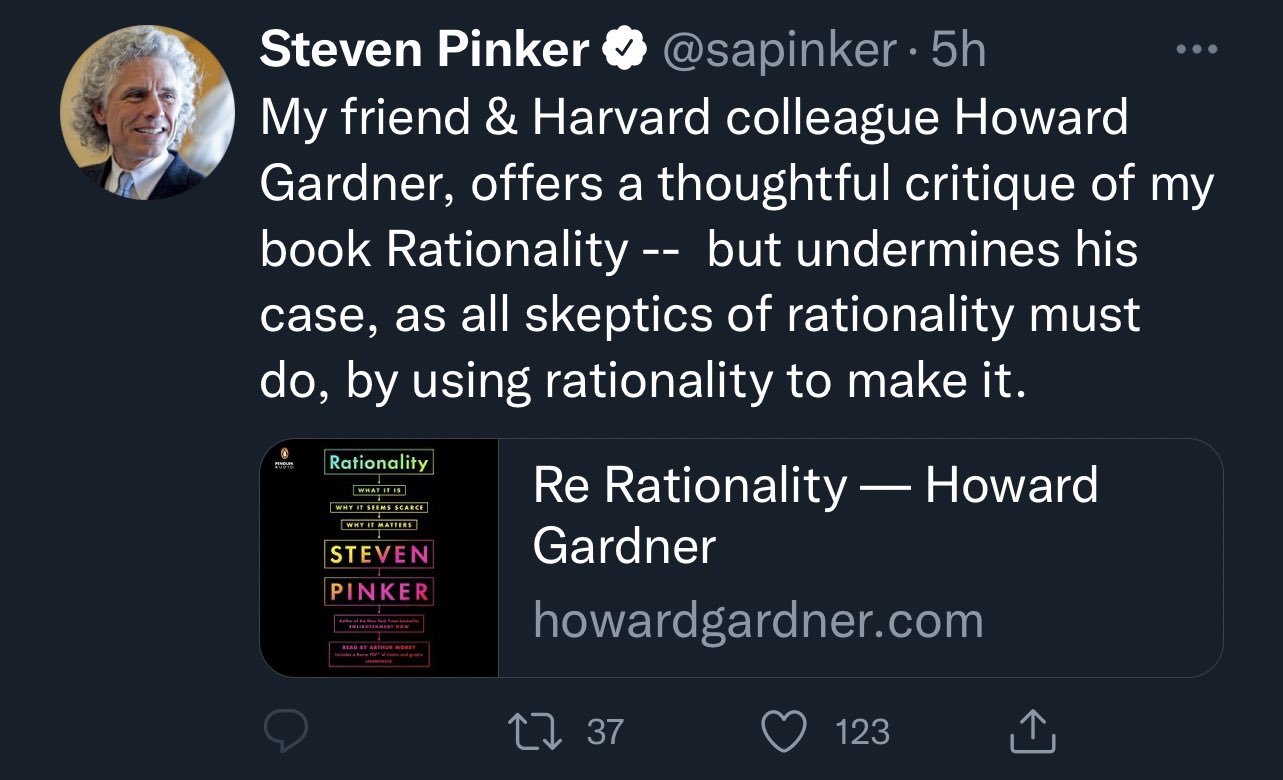Had an interesting thread on Twitter to day with Simon Jacobson. which ended with this exchange:
Don’t often read Chomsky since I’m never quite sure of his agenda anymore, but given the good-faith recommendation I dived straight into this one. Very interesting. Below my gutting / summarising Chomsky’s words with my annotation – check / indented.
Chomsky says …
Thought & language are creative processes.
Check.
Although remembered as a philosopher, Descartes was primarily a scientist working in the “mechanical” Galilean orthodoxy of his day.
Check.
“But [Descartes] discovered phenomena that appeared to escape the reach of mechanical science. Primary among them, for Descartes, was the creative aspect of language use, a capacity unique to humans that cannot be duplicated by machines and does not exist among animals, which in fact were a variety of machines, in his conception.”
Hmmm.
“Appeared” to escape mechanical science. Sure. Probably true then but not now – the idea of a “machine” moving, transforming, copying and creating stuff is much more generic than a literally “mechanical” device. Universal Turing Machine, Universal Constructor, etc. Use of language is manipulation of information, information which may be physically / mechanically embodied (in fact must be possible to be so) but which is independent of that embodiment. The idea of a “machine” has evolved since Galileo and Descartes even if the mechanical machine meme lingers in our minds.
Descartes invented res-cogitans – alongside – res-extensa.
Check.
Descartes, and Newton after him, had difficulty reconciling the “occult” interaction between these two and indeed between different res-extensa “at a distance”.
Check.
Contrary to popular conception of the ghost in the machine, it was res-extensa that Newton exorcised as unintelligible. Locke and Hume agreed.
Check.
The fundamentals of nature remained in obscurity – an absurdity conveniently ignored by Newtonian mechanics. “The goals of scientific inquiry were implicitly restricted: from the kind of conceivability that was a criterion for true understanding in early modern science from Galileo through Newton and beyond.”
Check.
(aka “Galileo’s Error” – in fact in the 21st C many a new pan-psychist might say the res-cogitans IS the more fundamental reality.)
“[Locke] wrote that just as God added to matter such inconceivable properties as gravitational attraction, he might also have “superadded” to matter the capacity of thought.” Until the late 20th C “decade of the brain” the absurdities remained ignored by all but historians.
Check.
[Physics > Chemistry > DNA > Evolution]
Skim.
‘The “new mysterianism” [of Owen Flanagan]Â is compared today with the “old mysterianism,” Cartesian dualism, its fate typically misunderstood. To repeat, Cartesian dualism was a perfectly respectable scientific doctrine, disproven by Newton, who exorcised the machine, leaving the ghost intact, contrary to what is commonly believed. The “new mysterianism,” I believe, is misnamed. It should be called “truism”‘ Most of science continues to ignore this reality.
Sorta … (except “machine” has evolved, see above.)
Deutsch as an example of modern science still seeing only limitless progress continuing its current trajectory (ignoring reality).
Irony.
Ha. Deutsch is of course one of those pushing the idea of a machine back to its information-theoretic universal-constructor fundamentals.
Honesty should lead us to concede.
Check.
My position (and Dennett’s) is that this whole mind-body dichotomy – (and the ongoing ignorance that it’s the body, the physical/material aspect, that is the least intelligible) – is best resolved by recognising their common foundation in information and computation. Persisting with “we have made no progress resolving this mystery” is to cling to outdated conceptions of science predating its new epistemological ontology. “It’s all still a mystery” isn’t much of a metaphysics, or indeed much of a critique of anyone else’s đ
Good read. Chomsky is clear in his thinking and writing. I just think Dennett, Deutsch and many more (EES / IIT) are much more advanced than Chomsky’s considerations here.
Like this:
Like Loading...




